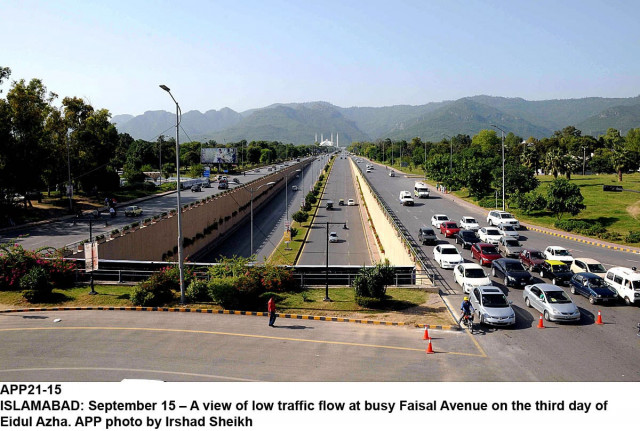Govt needs to give space to political-economic experts
Pakistan has been victim of unrealistic policies that could not outgrow certain limitations

Pakistan has been victim of unrealistic policies that could not outgrow certain limitations. PHOTO: APP
The most repeated ones are that this government took phenomenal amounts of local and foreign loans to ‘mis-spend’, neglected the social sector arrogantly and overspent on non-development activity. It pursued policies that saw the country’s exports plummet, overtaxed the small-income majority and appeased the high-income group, failed to unfetter the economy from the sluggish trends, despite claiming to have made great achievements in planning big in the energy and physical infrastructure spheres.
Our external borrowing binge and its repercussions
Maybe such appraisal is driven by political hostility and desperation. Still, you cannot dismiss the worries about the health of the Pakistani economy that undergoes instability and faces hostile market trends on the one hand and a persistent baggage of sluggishness on the other.
This economy has long been victim to unrealistic policies of governments that could not outgrow certain limitations of technical and political nature. Some of these limitations have been on account of the structural weaknesses of the state; others have been due to the painful imbalance in the share of power between the functionaries of public finance and the handlers of real powers in running this virtually dysfunctional state.
As I pointed out in my previous article carried by this newspaper, experts of political economy are allowed little room in the midst of public finance managers and the real powers of this country. Political-economic wisdom is required to steer Pakistan, out of where it is stuck in the course of protracted sluggishness compounded by the imbalanced allocation of funds.
The culture of irrational allocation of funds drives the public finance managers in a direction that is defeatist for the state and the economy and that is what actually causes the scare in the economy-sensitive circles.
Manipulating this scare to political ends and not coming forth with functional propositions for steering Pakistan out of this course is the most striking dilemma. And it particularly hurts to see that this dilemma cannot be wished away by traditional means.
Govt missed IMF external debt targets by $14 billion
The manipulators of this dilemma in the political and media circles outnumber the saner elements that plead political economic sense reinforced by better statecraft.
The tragedy of the situation is that such pleading is least welcome in a country that takes the course of regional and even global hostility in the name of ‘strategic’ and ‘national’ goals, while performing so poorly in the spheres of public finance and statecraft that its vulnerability scares the international watchdogs.
Manipulators of this tragic situation seek power in a politically docile environment and ignore the fact that political-economic experts need to be running the show to pull this country out of the painful void where it rots—not the bureaucratic public finance handlers.
Political forces need to initiate allowing space to political-economic experts with authority to supervise the public finance managerial corps. It should be for experts to create a balance between allocation of funds to three different spheres: economic-development, social sector and security apparatus.
Only a balanced allocation would guarantee oversight for functional accountability and without regular accountability there would be no stopping the contagious disorientation and waywardness.
Political opponents of the government do talk against the prevailing disorientation and waywardness, but they refuse to figure out how Pakistan fell into this trend and the incorrigible sluggishness.
Pakistan's way out of the debt crisis
When it comes to hammering some sense into political players that seek power in neglect of the facts about the slump of Pakistan, one needs to point out, those countries where priorities of taxing the economy and allocating the resources tilt in favour of wayward forces, the unavoidable outcome is despondency.
It is hard to outgrow this trap. It needs national rejuvenation led by experts politically motivated, not by politicians and government functionaries that seek applause and rewards for toeing the defeatist priorities.
There are enough indications of waywardness of the defeatist proportion in handling the state power and the economy in Pakistan. Members of the civil society, some of the political activists and media persons do intermittently point at the self-destruct direction Pakistan has taken. But mere criticism does not do at a stage where change of course is imperative.
Realistic and plausible propositions with practical details are required for the change of course at this juncture. When I say political-economic experts need a space in running the country’s economy, it implies that the policies they propose should be adopted without much reluctance, by all power-holders.
No traditional reservations should prevent them from submitting to well-meaning experts after seeing the results of their own doing. These reservations are mostly pretentious and many of them are based upon self-interest and a self-destruct hostile orientation.
When China and India were outgrowing the defeatist policies of the past, they allowed experts of political economy to function without shackles. They allowed them the authority enough to get their policy-proposals through.
Political forces that sought share in power by divisive means were not allowed to interfere with this process. Can Pakistan give itself such a chance?
The writer has worked with major newspapers and specialises in the analysis of public finance and geo-economics of terrorism
Published in The Express Tribune, October 17th, 2016.
Like Business on Facebook, follow @TribuneBiz on Twitter to stay informed and join in the conversation.



















COMMENTS
Comments are moderated and generally will be posted if they are on-topic and not abusive.
For more information, please see our Comments FAQ